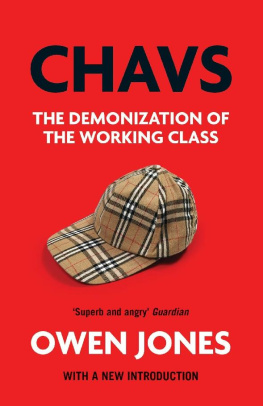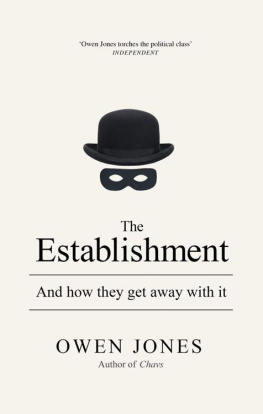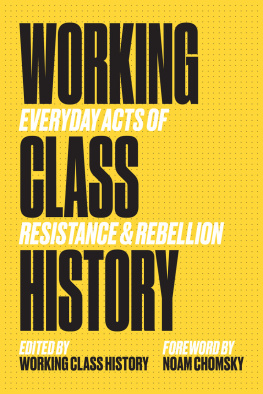Owen Jones - Chavs: The Demonization of the Working Class
Here you can read online Owen Jones - Chavs: The Demonization of the Working Class full text of the book (entire story) in english for free. Download pdf and epub, get meaning, cover and reviews about this ebook. year: 2012, publisher: Verso, genre: Politics. Description of the work, (preface) as well as reviews are available. Best literature library LitArk.com created for fans of good reading and offers a wide selection of genres:
Romance novel
Science fiction
Adventure
Detective
Science
History
Home and family
Prose
Art
Politics
Computer
Non-fiction
Religion
Business
Children
Humor
Choose a favorite category and find really read worthwhile books. Enjoy immersion in the world of imagination, feel the emotions of the characters or learn something new for yourself, make an fascinating discovery.
- Book:Chavs: The Demonization of the Working Class
- Author:
- Publisher:Verso
- Genre:
- Year:2012
- Rating:4 / 5
- Favourites:Add to favourites
- Your mark:
- 80
- 1
- 2
- 3
- 4
- 5
Chavs: The Demonization of the Working Class: summary, description and annotation
We offer to read an annotation, description, summary or preface (depends on what the author of the book "Chavs: The Demonization of the Working Class" wrote himself). If you haven't found the necessary information about the book — write in the comments, we will try to find it.
Chavs: The Demonization of the Working Class — read online for free the complete book (whole text) full work
Below is the text of the book, divided by pages. System saving the place of the last page read, allows you to conveniently read the book "Chavs: The Demonization of the Working Class" online for free, without having to search again every time where you left off. Put a bookmark, and you can go to the page where you finished reading at any time.
Font size:
Interval:
Bookmark:
CHAVS
CHAVS
TheDemonizationof theWorkingClass
OWEN JONES

London New York
This edition first published by Verso 2011 Owen Jones 2011 www.owenjones.org
All rights reserved
The moral rights of the author have been asserted
1 3 5 7 9 10 8 6 4 2
Verso
UK: 6 Meard Street, London W1F 0EG
US: 20 Jay Street, Suite 1010, Brooklyn, NY 11201 www.versobooks.com
Verso is the imprint of New Left Books
ISBN-13: 978-1-84467-696-5
British Library Cataloguing in Publication Data
A catalogue record for this book is available from the British Library
Library of Congress Cataloging-in-Publication Data
A catalog record for this book is available from the Library of Congress
Typeset in Fournier by MJ Gavan, Truro, Cornwall
Printed in Sweden by ScandBook AB
Contents
Its an experience weve all had. Youre among a group of friends or acquaintances when suddenly someone says something that shocks you: an aside or a flippant comment made in poor taste. But the most disquieting part isnt the remark itself. Its the fact that no one else seems the slightest bit taken aback. You look around in vain, hoping for even a flicker of concern or the hint of a cringe.
I had one of those moments at a friends dinner in a gentrified part of East London one winter evening. The blackcurrant cheesecake was being carefully sliced and the conversation had drifted to the topic of the moment, the credit crunch. Suddenly, one of the hosts tried to raise the mood by throwing in a light-hearted joke.
Its sad that Woolworths is closing. Where will all the chavs buy their Christmas presents?
Now, he was not someone who would ever consider himself to be a bigot. Neither would anyone else present: for, after all, they were all educated and open-minded professionals. Sitting around the table were people from more than one ethnic group. The gender split was fiftyfifty and not everyone was straight. All would have placed themselves somewhere left-of-centre politically. They would have bristled at being labelled a snob. If a stranger had attended that evening and disgraced him or herself by bandying around a word like Paki or poof, they would have found themselves swiftly ejected from the flat.
But no one flinched at a joke about chavs shopping in Woolies. To the contrary: everybody laughed. I doubt that many would have known that this derogatory term originates from the Romany word for child, chavi. Neither were they likely to have been among the 100,000 readers of The Little Book of Chavs, an enlightened tome that describes chavs as the burgeoning peasant underclass. If they had picked it up from a bookshop counter for a quick browse, they would have learned that chavs tend to work as supermarket checkout cashiers, fast-food restaurant workers and cleaners. Yet deep down, everyone must have known that chav is an insulting word exclusively directed against people who are working class. The joke could easily have been rephrased as: Its sad that Woolworths is closing. Where will the ghastly lower classes buy their Christmas presents?
And yet it wasnt even what was said that disturbed me the most. It was who said it, and who shared in the laughter. Everyone sitting around that table had a well-paid, professional job. Whether they admitted it or not, they owed their success, above all, to their backgrounds. All grew up in comfortable middle-class homes, generally out in the leafy suburbs. Some were educated in expensive private schools. Most had studied at universitieslike Oxford,LSEorBristol.The chances of someone from a working-class background ending up like them were, to say the least, remote. Here I was, witnessing a phenomenon that goes back hundreds of years: the wealthy mocking the less well-off.
And it got me thinking. How has hatred of working-class people become so socially acceptable? Privately educated, multi-millionaire comedians dress up as chavs for our amusement in popular sitcoms such as Little Britain. Our newspapers eagerly hunt down horror stories about life among the chavs and pass them off as representative of working-class communities. Internet sites such as ChavScum brim with venom directed at the chav caricature. It seems as though workingclass people are the one group in society that you can say practically anything about.
* * *
You would be hard pushed to find someone in Britain who hates chavs as much as Richard Hilton. Mr Hilton is the chief executive of Gymbox, one of the trendier additions to Londons flourishing fitness scene. Known for its creatively titled gym classes, Gymbox is unashamedly aimed at fitness freaks with deep pockets, demanding a steep 175 joining fee on top of 72 a month for membership. As Mr Hilton himself explains, Gymbox was launched to tap into the insecurities of itspredominantly white-collarprofessionalclientele. Memberswere asking for self-defence classes, as they were scared living in London, he says.
In spring 2009, Gymbox unveiled a new addition to its already eclectic range of classes (including Boob Aerobics, Pole Dancing and Bitch Boxing): Chav Fighting. Dont give moody grunting Chavs an ASBO, its website urged, give them a kicking. The rest of the promotional spiel did not pull its punches either, in the voice of a vigilante with a good grasp of PR. Forget stealing candy from a baby. Well teach you how to take a Bacardi off a hoodie and turn a grunt into a whine. Welcome to Chav Fighting, a place where the punch bags gather dust and the world is put to rights. The leaflets were even more candid. Why hone your skills on punch bags and planks of wood when you can deck some Chavs a world where Bacardi Breezers are your sword and ASBOs are your trophy.
There were some who felt that glorifying beating people up might be overstepping the mark. When the Advertising Standards Authority was called in, Gymbox responded with technicalities. It was not offensive, they claimed, because nobody in society would admit to being a Chav; it was not a group to which people wanted to belong. Amazingly, the ASA cleared Gymbox on the basis that chav-fighting classes would be unlikely to condone or incite violence against particular social groups
You would have to speak to Richard Hilton to appreciate the depths of hatred that inspired the class. Defining chavs as young Burberryclad street kids, he went on to explain:
They tend to live in England but would probably pronounce it Engerland. They have trouble articulating themselves and have little ability to spell or write. They love their pit bull dogs as well as their blades. And would happily shank you if you accidentally brush past them or look at them in the wrong way. They tend to breed by the age of fifteen and spend most of their days trying to score super-skunk or whatever gear they can get their sweaty teenage hands on. If they are not institutionalized by twenty-one they are considered pillars of strength in the community or get much respect for being lucky.
It is no surprise that, when asked if so-called chavs were getting a hard time in Britain, his response was blunt: No, they deserve it.
Apparently the class was a hit with gym-goers. Describing it as one of the most popular classes we have ever run, he claimed that: Most peoplerelatedtoitandenjoyedit.AfewofthePCbrigadewereoffended by it. And yet, intriguingly, Mr Hilton does not think of himself as a bigotfar from it. Sexism, racism and homophobia, for example, were completely unacceptable.
An extremely successful businessman, Richard Hilton has tapped into the fear and loathing felt by some middle-class Londoners towards the lower orders. It is a compelling image: sweating City bankers taking out their recession-induced frustrations on semi-bestial poor kids. Welcome to Gymbox, where class war meets personal fitness.
Next pageFont size:
Interval:
Bookmark:
Similar books «Chavs: The Demonization of the Working Class»
Look at similar books to Chavs: The Demonization of the Working Class. We have selected literature similar in name and meaning in the hope of providing readers with more options to find new, interesting, not yet read works.
Discussion, reviews of the book Chavs: The Demonization of the Working Class and just readers' own opinions. Leave your comments, write what you think about the work, its meaning or the main characters. Specify what exactly you liked and what you didn't like, and why you think so.









